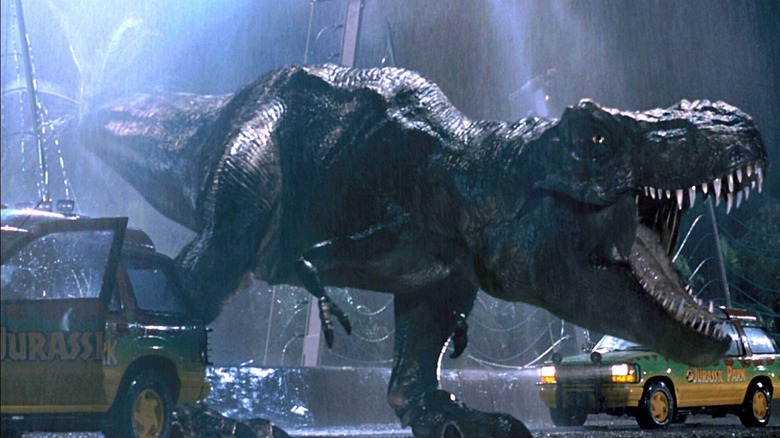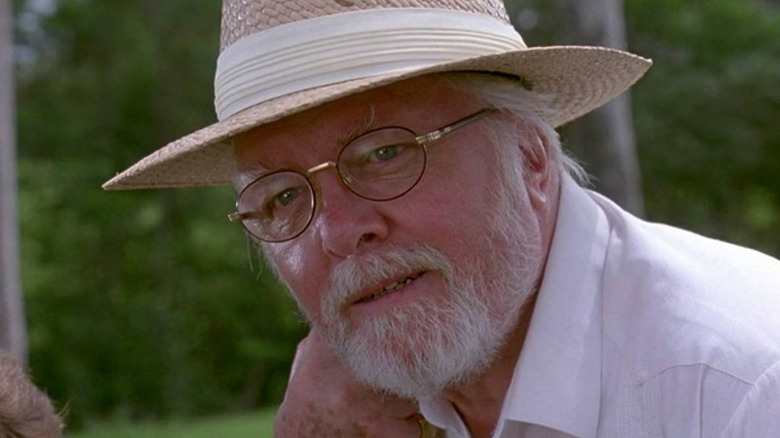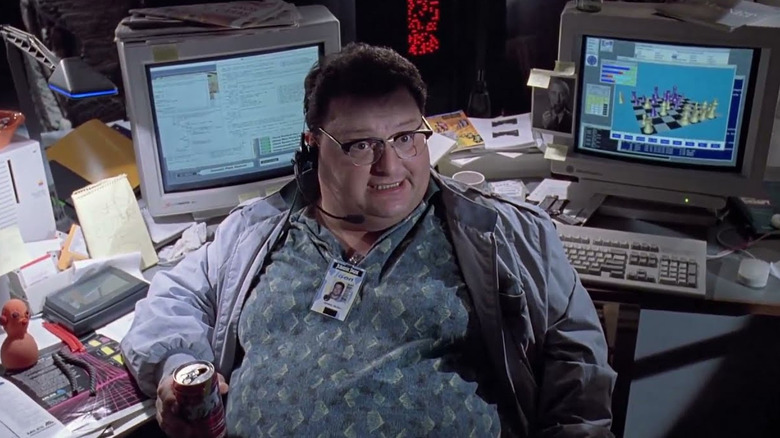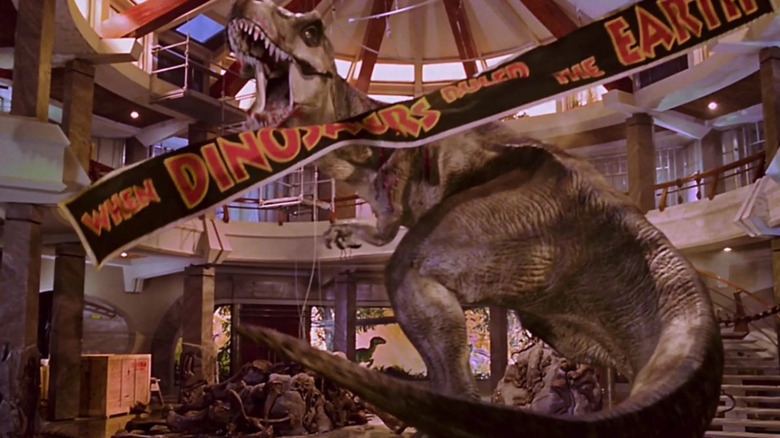Not Much Of Michael Crichton's Script Made It Into Jurassic Park
Almost 30 years ago, Spielberg had one of the most impressive filmmaking years any director has had, releasing the Academy Award-winning films "Schindler's List" and the "Jurassic Park" in the span of just six months. While "Schindler's List" was a passionate and personal project for the filmmaker, his adaptation of Michael Crichton's novel "Jurassic Park" was a groundbreaking blockbuster sci-fi thriller that changed the VFX industry forever.
In case you've been living under a rock the past three decades, "Jurassic Park" follows a wealthy but misguided dreamer who uses his millions to create a theme park filled with genetically engineered dinosaurs. He also has the audacity to invite his grandchildren to spend the weekend with him on his private Caribbean island while their parents are getting a divorce. Of course, his mistakes don't stop there, as he also schedules a tour of the park for a group of visitors the same weekend, while ignoring one of his more questionable employees to the point where they decide sabotage the park and get some money from a competitor. And that's all before a tropical storm shuts down the park's power systems and lets all the hungry dinos loose.
"Jurassic Park" spawned a franchise that has never quite lived up to the original and inspired a whole generation to consider becoming paleontologists. The film was also a big hit for Crichton, who had written and directed movies before, but never to the level of success of "Jurassic Park," which he adapted for the screen himself. However, despite an on-screen credit as screenwriter, there's barely anything from Crichton's original script in the final version of "Jurassic Park."
Ch-ch-changes
Even before it was published, Crichton's novel "Jurassic Park" was so anticipated that its film rights caused a bidding war. In the end, Spielberg (with the help of Universal) won the bidding war and acquired the rights for $1.5 million, and Crichton himself was hired to adapt his own work for the screen for an additional $500,000.
Crichton reportedly wrote a draft that was much closer to his original novel than the final film, and the version of the story that made it to theaters changed many things drastically. Ian Malcolm seemingly dies, the two kids are the complete opposites of their movie counterparts, Dr. Henry Wu is much more of a villain (like in the "Jurassic World" movies) and he also dies in the first book. In general, there is a lot more violence, and a few dinosaurs even make it to the mainland. Oh, and the Costa Rican government bombs the entire island to ensure the dinosaurs all die.
One of the biggest changes, however, came in the tone and themes of the story. Spielberg's Academy Award-winning film had a much bigger adventurous tone (even if it still was quite scary and bloody at times) and centered its message around scientific greed and the consequences of playing god. The original "Jurassic Park" novel, however, was more of a techno-thriller in the vein of Crichton's other novels.
Spared some expense
Indeed, the novel had a much bigger focus on the science behind bringing dinosaurs back, with Crichton showing the worst case scenario of the possibilities of genetic manipulation. More importantly, the novel had a bigger focus on corporate greed. Richard Attenborough's portrayal of John Hammond had more in common with his Santa Claus from the "Miracle on 34th Street" remake than with the ruthless businessman from Crichton's text. The novel makes it clear from the very beginning that the park is doomed to fail since Hammond keeps sparing expenses at every chance he gets (despite him loving to say otherwise). Many aspects of the park are already half-broken, and Dennis Nedry is simply the straw that broke the camel's back.
Interestingly enough, the poor state of "Jurassic Park" was actually brought back into the franchise, not in the films, but in the animated series "Jurassic World: Camp Cretaceous." That show spends a lot of its first season showcasing how much of Jurassic World is just broken. There are seat belts that don't work, security doors that don't stay close, the emergency phone lines don't connect, brakes that don't work, and there doesn't even seem to be anyone on the island aware there is a summer camp with children in the same place as the hungry dinosaurs. The show makes it clear that Hammond having "spared no expense" is a sham, and his missteps created a lot of problems behind the scenes. But I digress.
Welcome to Jurassic Park
In the end, Crichton's script never made it to screen. Speaking with Collider, screenwriter David Koepp talked about never actually meeting Crichton. Koepp basically did a rewrite from page one. "It was a different movie," Koepp said about the original draft. "There were ideas — and this often happens — that Steven had wanted worked out. The carryover was the Steven's ideas part."
Spielberg reportedly liked John Hammond's showmanship and wanted to focus on that rather than the ruthless and greedy capitalist. Additionally, Koepp once told Consequence that Spielberg had a number of set pieces in mind even before the script was made:
"He knew which sequences he wanted to shoot. Then we made up some more, swapped up this for that, and, you know, the normal process. So, my primary — really, my only — collaboration with that script was with Steven — and it was pretty thrilling."
The result may not have been a super faithful adaptation of the original techno-thriller novel, but it was one of the biggest magic tricks Steven Spielberg and the folks at Industrial Light and Magic ever pulled off. It was a movie that had both the sense of wonder and adventure of an Amblin movie, while still keeping the suspense and the dinosaurs-killing-people essence of the novel for what remains one of the best summer blockbusters ever.



